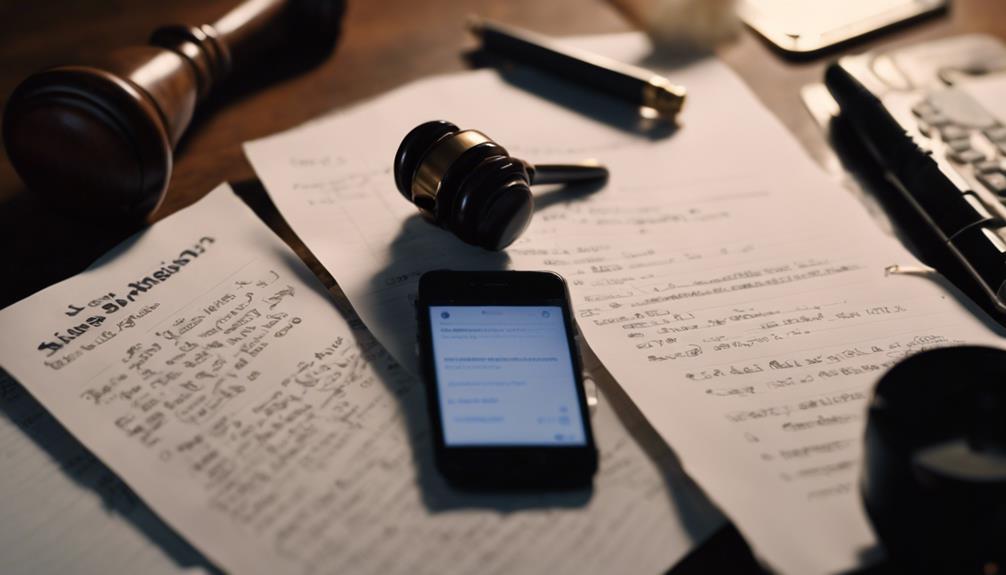In order to demonstrate narcissistic abuse, it is important to carefully document instances with dates and descriptions in a journal. Keep a record of emotional manipulation tactics such as gaslighting, and save any communication evidence. Collect witness statements to bolster your case. Seek professional assistance for emotional support, legal guidance, and community resources. It is crucial to understand manipulative behaviors for self-protection. By focusing on gathering evidence, documentation, and witness testimonies, you can build a solid case. Provide objective testimony in court, and seek legal advice for effective presentation. Ensuring legal protection involves maintaining detailed records and using them as evidence. Prioritize your mental health and seek supportive individuals to help you cope with narcissistic abuse effectively. More information is available on managing this complex issue.
Key Takeaways
- Keep a detailed journal documenting instances of abuse.
- Save electronic communications as evidence.
- Collect witness statements to strengthen your case.
- Maintain a clear timeline of events for legal proceedings.
- Seek legal guidance and support from experienced professionals.
Recognizing Manipulative Tactics
Recognizing manipulative tactics is essential in identifying and addressing narcissistic abuse. Emotional manipulation, such as gaslighting, is a key sign of narcissistic abuse. This tactic involves making victims doubt their own reality and sanity, causing confusion and self-doubt.
Verbal abuse, including insults, threats, and lies, is another common strategy used by narcissists to control and break down their victims emotionally. Being aware of these manipulative tactics can help individuals recognize when they're being targeted by a narcissist.
Signs of narcissistic abuse also include the narcissist avoiding responsibility for their actions. Victims may find themselves justifying and protecting the narcissist's image, even when they're clearly in the wrong.
Additionally, making everything a competition is a tactic used by narcissists to belittle others' accomplishments and boost their own ego. By understanding these manipulative behaviors, individuals can better protect themselves from falling prey to narcissistic abuse.
Documenting Abusive Behaviors

We diligently record instances of abusive behaviors in a detailed journal, noting dates, times, and specific incidents to build a strong case against the abuser. Documenting abusive behaviors is important in establishing a clear record of what's occurred.
It's essential to include descriptions of emotional abuse such as gaslighting and emotional blackmail in your documentation. Additionally, documenting witnesses who observed the abusive behaviors can further strengthen your case.
Save any written evidence, like text messages, emails, or voicemails, that demonstrate the abuse you have experienced. Ensuring your documentation provides a clear and chronological account of the abusive behaviors you have faced is crucial for building a compelling case.
Seeking Professional Support

After meticulously documenting instances of abusive behaviors, seeking professional support is essential for individuals dealing with narcissistic abuse. Seeking emotional and mental health support is vital for maneuvering through the complexities of recovering from narcissistic abuse. Establishing a robust support system can aid in healing and provide validation for survivors. Here is a table outlining the types of professional support individuals may consider:
| Type of Support | Description | Benefits |
|---|---|---|
| Therapy | Therapy from a mental health professional specializing in narcissistic abuse for healing and support | Emotional healing and coping strategies |
| Legal Guidance | Consult with lawyers experienced in handling cases involving narcissistic abuse for legal guidance | Legal protection and advice |
| Support Groups | Join support groups tailored for survivors of narcissistic abuse to find validation and community | Sharing experiences and building connections |
| Domestic Violence Advocates | Work with advocates who understand the dynamics of narcissistic abuse for additional support | Specialized support and resources |
| Self-Care Practices | Engage in self-care practices like mindfulness, physical activity, and self-compassion | Coping mechanisms and stress relief |
Gathering Evidence and Records

Gathering evidence and records is a critical step in building a strong case against narcissistic abuse. To effectively document and prove such abuse, it's crucial to:
- Keep a detailed journal: Record incidents with dates, times, and descriptions to establish a pattern of behavior and manipulation.
- Save electronic communications: Preserve text messages, emails, and voicemails that provide evidence of manipulation and mistreatment for legal purposes.
- Collect witness statements: Gathering accounts from observers who've seen the abuse occur can greatly strengthen the case against the narcissistic individual.
Understanding Legal Procedures

Understanding the legal system efficiently is vital when seeking justice for narcissistic abuse. Proper knowledge of legal procedures is essential in proving abuse in court. Documenting evidence following correct legal protocols is a key step in building a strong case.
It's important to make sure that all evidence is gathered and handled appropriately to be admissible in court. Seeking support from experienced lawyers specializing in abuse cases can greatly benefit your situation. These lawyers have the expertise and knowledge to navigate the legal system effectively.
They can provide valuable guidance on the best legal strategies to employ and help in gathering concrete evidence to support your case. By following proper legal procedures, documenting evidence meticulously, and enlisting the help of experienced lawyers, you can strengthen your case and increase the chances of proving narcissistic abuse in a court of law.
Building a Strong Case

When building a strong case to prove narcissistic abuse, it's essential to focus on evidence collection strategies, the importance of documentation, and the value of witness testimony.
Detailed journaling of incidents, saving text messages and emails containing evidence, and gathering witness statements play an important role in strengthening your case.
Evidence Collection Strategies
To construct a compelling case against narcissistic abuse, prioritizing the meticulous documentation of abusive incidents is paramount for establishing a robust timeline of events. When gathering evidence to support claims of emotional distress and manipulation, consider the following strategies:
- Detailed Journaling: Record abusive incidents with dates, times, and descriptions to create a thorough timeline.
- Saving Communication: Keep text messages, emails, and voicemails that show evidence of manipulation and control tactics.
- Witness Statements: Collect testimonies from observers who've witnessed the abuse to strengthen the credibility of your case.
Documentation Importance
We can strengthen our case against narcissistic abuse by recognizing the pivotal role documentation plays in establishing a compelling narrative of the abusive behaviors experienced. Keeping a detailed journal with dates, times, and descriptions of abusive incidents is often essential in documenting the pattern of emotional abuse.
Saving text messages, emails, and voicemails that contain evidence of manipulation and control is vital for building a strong case against the abuser. This documentation importance can't be overstated, as it serves as tangible proof of the emotional distress caused by the abuser.
Witness Testimony Value
Witness testimony plays an essential role in bolstering the strength of a case against narcissistic abuse by providing additional credibility and diverse perspectives. When it comes to proving narcissistic abuse, witness testimony can be pivotal. Here's why:
- Credibility: Witnesses who've observed the abuse firsthand can offer powerful accounts that support the victim's experiences.
- Insights from Experts: Testimonies from experts in narcissistic abuse can provide valuable insights and professional support to validate the victim's claims.
- Establishing Patterns: Witness accounts help in establishing a pattern of behavior and manipulation by the narcissistic abuser, painting a clearer picture of the abuse for the court.
Having multiple witness testimonies can corroborate the victim's story, strengthening the case against the abuser.
Handling Gaslighting and DARVO

When facing gaslighting and DARVO tactics, it's important to trust your instincts and document instances of manipulation and denial.
Gaslighting involves making you doubt your reality, while DARVO is a tactic where the abuser denies, attacks, and reverses roles to evade responsibility.
To confront these tactics, keep a record of conversations, emails, or messages that demonstrate these behaviors. Trust your gut feelings and seek support from trusted individuals who can validate your experiences.
Remember, your reality is valid, and speaking up is essential in proving narcissistic abuse. By documenting these instances, you can build a strong case to protect yourself and seek justice.
Stay strong and believe in your truth as you navigate these challenging situations. Remember, you aren't alone, and there are resources available to assist you in handling gaslighting and DARVO tactics effectively.
Protecting Your Mental Health

Looking after oneself is essential for safeguarding mental health amidst the challenges of dealing with narcissistic abuse. When facing such difficult circumstances, it's important to prioritize emotional well-being and resilience.
Here are three key ways to protect your mental health:
- Engage in therapy: Professional guidance from therapists can provide valuable support in maneuvering emotional challenges and maintaining your well-being throughout legal proceedings.
- Practice self-compassion: Validate your experiences and emotions by surrounding yourself with positive influences and supportive individuals. Setting boundaries is essential to safeguard your mental health from the effects of narcissistic abuse.
- Prioritize self-care: Engage in activities like mindfulness, physical exercise, and connecting with a support network. These practices promote emotional well-being and resilience, helping you cope effectively with the stress of dealing with narcissistic abuse.
Testifying Effectively in Court

To present a compelling case in court regarding narcissistic abuse, focus on delivering clear and factual testimony without engaging in emotional reactions or arguments with the abuser.
When testifying in situations such as divorce- and child custody hearings in Family Court, it's essential to convey your experiences of emotional and psychological abuse objectively. Stick to the facts, refrain from exaggerations, and avoid making assumptions to strengthen your credibility.
Prepare for potential challenges, including manipulation tactics aimed at discrediting your testimony, by maintaining composure and staying focused on the relevant information. Seek guidance from legal professionals to help you effectively present your testimony and evidence.
Ensuring Legal Protection

To guarantee legal protection in cases of narcissistic abuse, we recommend taking the following steps:
- Request Character Reference Letters: Obtain character reference letters from individuals who've witnessed the abuse or can attest to your character. These letters can provide significant support for your case in demonstrating the impact of the abuse.
- Document Interactions with the Abuser: Keep a detailed record of all interactions with the narcissist, highlighting specific instances of abuse. This documentation can serve as evidence in court proceedings and strengthen your case.
- Maintain Detailed Records: It's essential to maintain thorough records of all abusive incidents and relevant communications. These records can help substantiate your claims of domestic abuse and provide a clear timeline of events for legal purposes.
Frequently Asked Questions
How Do You Prove You Are a Victim of Narcissistic Abuse?
When proving narcissistic abuse, gather evidence like messages, emails, and witness accounts to showcase manipulation tactics. Maintain a detailed journal noting dates and descriptions to establish a timeline of abuse.
Compile a strong collection of proof to support legal claims. By documenting instances and seeking outside observations, we can build a robust case to validate our experiences and seek justice.
It's imperative to gather a variety of evidence to demonstrate the patterns of abuse.
What Qualifies as Narcissistic Abuse?
Narcissistic abuse encompasses various manipulative tactics to exert power and control over victims. Behaviors like belittling, isolation, and financial manipulation are common signs. Victims often face confusion and self-doubt due to this abuse.
Emotional, mental, physical, financial, spiritual, or sexual mistreatment can all be forms of narcissistic abuse. The abuser's goal is to maintain dominance through manipulation and psychological tactics, undermining the victim's self-worth.
Can Narcissistic Abuse Be Proven in Court?
Yes, narcissistic abuse can be proven in court through various methods. Documenting detailed incidents in a journal with dates, times, and witnesses is essential. Tangible evidence like saved texts, emails, and communications is crucial in showcasing emotional distress caused by the abuse.
Expert testimonies and witnesses add credibility. Seeking legal support from professionals experienced in handling such cases can effectively navigate the complexities of proving narcissistic abuse in court.
How Do You Show a Narcissist in Court?
When showing a narcissist in court, it is crucial to present concrete evidence like saved messages and emails. Seeking expert testimonies can also strengthen your case. Keeping a detailed journal, gathering witness statements, and consulting legal professionals are essential steps in building a strong case. These actions not only help in proving narcissistic abuse but also provide a deeper understanding of the situation. By following these guidelines, individuals can effectively navigate the complexities of proving narcissistic abuse in court and ensure their case is presented convincingly.
These steps help build a strong case and provide a deeper understanding of the abuse. By following these guidelines, we can effectively navigate the complexities of proving narcissistic abuse in court and make sure our case is presented convincingly.
Conclusion
In the intricate dance of proving narcissistic abuse, we must tread carefully, armed with awareness and evidence. Like a detective unraveling a mystery, we piece together the puzzle of manipulation and gaslighting.
With diligence and determination, we document, seek support, gather proof, and navigate legal channels. By standing firm and speaking our truth, we protect ourselves and seek justice.
Let's not falter in the face of adversity, but stand strong in our quest for validation and healing.










